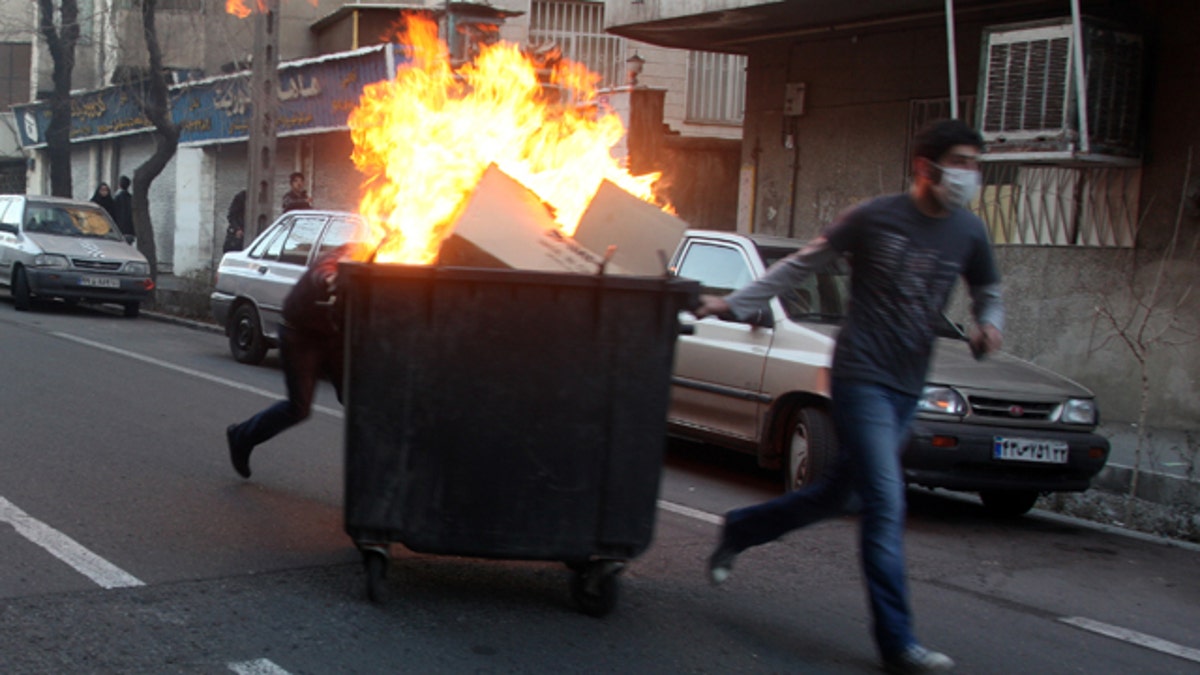
Feb. 14: This photo, taken by an individual not employed by the Associated Press and obtained by the AP outside Iran, shows Iranian protestors moving a garbage can which is set on fire during an anti-government protest in Tehran, Iran. (AP)
Iranians who have taken to the streets in protest this week are no longer targeting just President Mahmoud Ahmadinejad -- they're aiming straight for the country's "Supreme Leader" himself.
“It’s no more ‘Where’s my vote?’ The stakes are much higher now," one Iranian told Fox News. "People are calling for ‘Death to the Dictator’.”
And they don’t mean Ahmadinejad. The young people protesting in several Iranian cities were calling out Ayatollah Ali Khamenei, the country's "Supreme Leader." Khamenei's position goes to the heart of the Islamic Republic’s system -- the “Velayat e Faqih,” or rule by a religious leader who calls the shots before the Hidden Imam, or Shi’ite messiah, returns to earth.
“Mubarak, Ben Ali, Nobateh Seyed Ali,” some of the demonstrators chanted. In other words, the Egyptian and Tunisian leaders are gone, it’s Ali Khamenei's (Iran’s Supreme Leader) turn next.
It has been difficult to get credible information about the workings of the so-called "Green Movement" opposition since the severe crackdown on media in Iran and disputed presidential election in 2009. Some say as many as tens of thousands came out on Feb. 14 to demand change -- chanting and burning tires to diffuse the tear gas fired on them. There were further scuffles later in the week, when one of the two protesters who were shot dead earlier in the week, was buried.
The Iranian blogosphere is crackling with excitement over the protests. “People are on an incredible high,” said one observer.
Though the protests in Iran Monday were small compared with those that were brutally repressed in 2009, many of the country's young people feel particularly engaged.
One of those killed in the clashes this week was a 22-year-old student who reportedly had written on his Facebook page before going out to protest, “Almighty God, help me die standing up, rather than lying low in humiliation.” A 26-year-old student also was killed.
According to sources and a friend of the deceased man, there has been enormous pressure by the regime on his family, to the extent that those who want to offer condolences have not been able to visit them.
“If the regime had given a permit for a peaceful demonstration, no one would need to get shot," wrote Iranian blogger Potkin Azarmehr.
Former Iranian diplomat Mehrdad Khonsari told Fox News, “Call for reform of the system is non-existent. These people want regime change.”
Khonsari also told Fox News that the original Green Movement leaders, former presidential candidates Mehdi Karroubi and Mir Hossein Mousavi, are irrelevant now because they have called for change within the system. The young people out marching, however, want the whole system changed.
Khonsari said that for each demonstrator who came out, a thousand others would have liked to. Mohsen Sazegara, one of the founders of Iran’s Revolutionary Guard who now lives in suburban Washington, D.C., explains how “18 months of brutal repression by the Islamic regime has not frightened people.”
Khonsari added: “All these people knew they could be arrested, tortured, but they came. That’s a tremendous thing.”
Khonsari and others also pointed to the schisms within the establishment, which include some clerics within the Islamic Republic system who have denounced the repression. Grand Ayatollah Sanei, one of the highest religious leaders in the country, has called the regime “despotic.” Khonsari said people like the Revolutionary Guards turn to these Ayatollahs for emulation. Therefore, their criticism of the regime is significant.
But former Revolutionary Guardsman Mohsen Sazegara said the relevance of the clergy has been severely diminished over the years. “Now we have a middle class demanding human rights, not talking about the right to carry out religious duties anymore. They want the right to elect the leaders they want and they want freedom of speech.”
Sazegara said he believes a serious economic crisis is just around the corner in Iran. While the educated middle class has been a big part of the Green Movement, the lower classes could add important momentum. Sazegara predicted inflation in Iran could hit 60-70 percent in the coming months, as a result of many factors.
Sazegara believes the economic situation is going to be the factor to watch, as the street protests may go quiet, given the difficulty the demonstrators have maneuvering around a heavy police presence, which some observers point out, is not a sustainable situation, over time.
